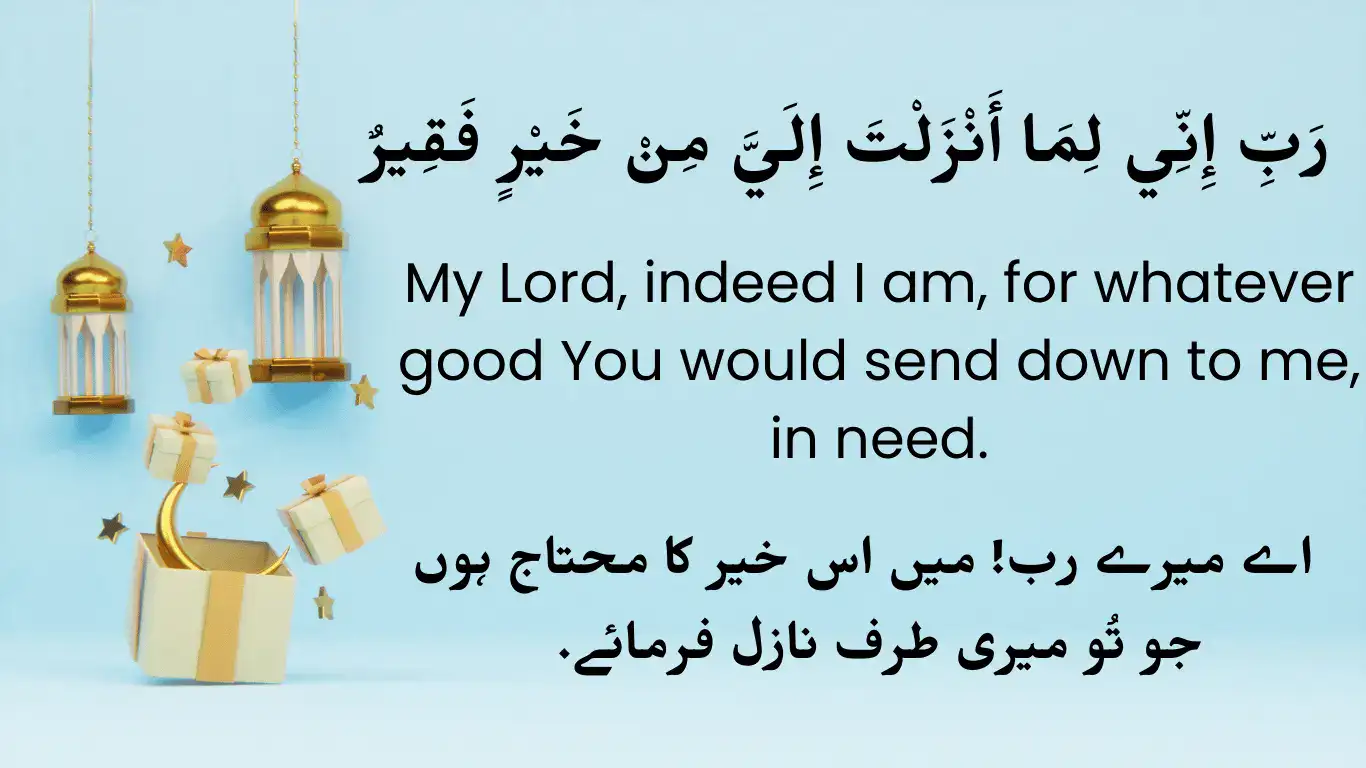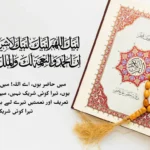Introduction
In moments of hardship and uncertainty, we often look to Allah for guidance, sustenance, and comfort. One of the most profound prayers that expresses humility and reliance on Allah is Rabbi inni lima anzalta ilayya min khairin faqir—a supplication made by Prophet Musa (AS) when he was in desperate need of help. This dua, found in Surah Al-Qasas (28:24), carries a timeless message of trust and dependence on Allah’s blessings.
In this article, we’ll explore the full meaning, context, and spiritual significance of this powerful dua, examining each part in detail.
| Meaning of Inna Ma Al Usri Yusra | إِنَّ مَعَ الْعُسْرِ يُسْرًا |
| Allahumma Barik (اللَّهُمَّ بَارِكْ) – Divine Blessings |
| Ya Hayyu Ya Qayyum Birahmatika Astaghees |
| Hasbi Rabbi Jallallah Naat Lyrics in Urdu |
The Full Dua “Rabbi Inni Lima Anzalta” in Arabic, Transliteration, and Translation
- Arabic: رَبِّ إِنِّي لِمَا أَنْزَلْتَ إِلَيَّ مِنْ خَيْرٍ فَقِيرٌ
- Transliteration: Rabbi inni lima anzalta ilayya min khairin faqir
- English Translation: “My Lord, indeed I am, for whatever good You would send down to me, in need.”
- Urdu Translation: “اے میرے رب! میں اس خیر کا محتاج ہوں جو تُو میری طرف نازل فرمائے۔”
The Context of “رَبِّ إِنِّي لِمَا أَنْزَلْتَ”
This dua was recited by Prophet Musa (AS) after fleeing Egypt to escape persecution. In his journey to Madyan, he found himself without shelter, food, or companionship. In that vulnerable state, he sought Allah’s assistance, humbly acknowledging his dependence on Allah’s mercy and provision. His plea, “Rabbi inni lima anzalta ilayya min khairin faqir,” reflects a heart full of humility and trust in Allah’s infinite kindness and generosity.
Verse Analysis and Lessons from “رَبِّ إِنِّي لِمَا أَنْزَلْتَ”
1. “Rabbi” – My Lord
The supplication begins with the word “Rabbi” (رَبِّ), meaning “My Lord.” It signifies a close relationship and deep trust in Allah. By calling upon Allah as “My Lord,” Prophet Musa (AS) acknowledges that Allah alone is the caretaker, sustainer, and provider of all needs. This word reminds believers to turn to Allah first in times of need, establishing Him as the ultimate source of help and guidance.
2. “Inni” – Indeed, I Am
The next part, “Inni” (إِنِّي), translates to “indeed, I am.” This phrase is an affirmation of one’s condition and state of being, emphasizing humility. Prophet Musa (AS) uses “inni” to openly acknowledge his vulnerability, accepting his dependence on Allah. This level of humility is a powerful lesson for us, teaching that we should never feel self-sufficient; rather, we should admit our needs to Allah openly.
3. “Lima Anzalta Ilayya” – For Whatever You Send Down to Me
The phrase “Lima anzalta ilayya” (لِمَا أَنْزَلْتَ إِلَيَّ) means “for whatever You would send down to me.” This part shows that Prophet Musa (AS) is not specifying a particular need or outcome. Instead, he leaves it to Allah’s wisdom to decide what is best. This general approach highlights complete trust in Allah’s understanding of our needs, which may be beyond our knowledge.
4. “Min Khairin Faqir” – In Need of Any Good
The phrase “Min khairin faqir” (مِنْ خَيْرٍ فَقِيرٌ) translates to “in need of any good.” Here, Prophet Musa (AS) expresses his openness to receive any blessing Allah may grant. The word “khair” (خَيْر) encompasses all forms of goodness—spiritual, emotional, physical, and material. The term “faqir” (فَقِير) conveys a state of poverty or need. Together, these words depict a person who is entirely reliant on Allah for sustenance and help.
The Spiritual Significance of “رَبِّ إِنِّي لِمَا أَنْزَلْتَ”
This supplication is a beautiful reminder of the importance of relying on Allah, especially in times of hardship. It conveys a message of patience, humility, and trust. When we face challenges, we are encouraged to seek Allah’s help, knowing that He is aware of our needs and that His blessings come in many forms.
Practical Ways to Use “رَبِّ إِنِّي لِمَا أَنْزَلْتَ” in Daily Life
- During Financial Hardship: Recite this dua when seeking Allah’s assistance with financial difficulties, trusting that He is the provider of all sustenance.
- Seeking Guidance: When in need of direction or clarity, this dua reminds us to depend on Allah’s wisdom and let Him guide us toward the best path.
- Building Patience and Trust: This supplication helps strengthen our patience, teaching us to wait for Allah’s help and rely on His plan, especially during times of struggle.
FAQs:
The dua means, “My Lord, indeed I am, for whatever good You would send down to me, in need.” It reflects humility, expressing one’s reliance on Allah for all forms of goodness and provision.
Prophet Musa (AS) recited this dua after fleeing from Egypt to Madyan. He was in a vulnerable state, without resources or support, and relied on Allah for sustenance, trusting in His mercy and provision.
This dua encourages believers to seek Allah’s help during hardships, reminding us that Allah knows our needs and will provide us with what is best. It fosters patience and trust in Allah’s plan.
Conclusion
The dua “Rabbi inni lima anzalta ilayya min khairin faqir” is a powerful example of humility, reliance, and trust in Allah’s mercy. Through this supplication, Prophet Musa (AS) demonstrated his complete dependence on Allah, seeking help without specifying his needs, and leaving the outcome in Allah’s hands. This prayer is a beautiful reminder for all of us to approach Allah with sincere hearts, trusting that He will provide us with everything we need, exactly when we need it.




